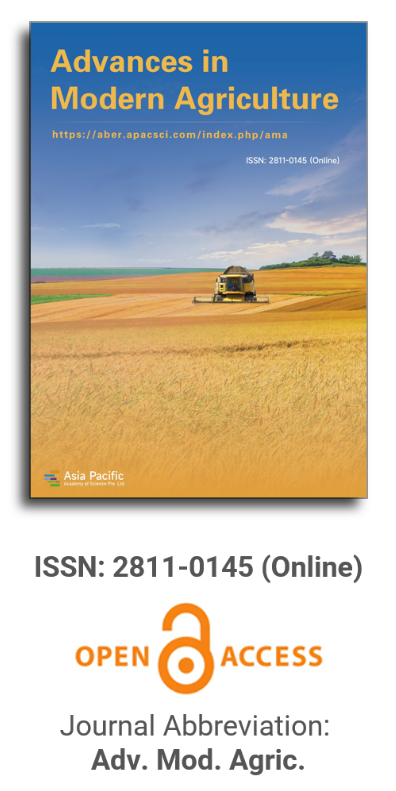


Agroecological bases for the adaptation of agriculture to climate change
Vol 1, Issue 1, 2020
VIEWS - 5544 (Abstract)
Download PDF
Abstract
Although many indigenous and peasant populations are particularly exposed to the impacts of climate change and are vulnerable, some communities are actively responding to the changing climate and have demonstrated innovation and resilience, using a diversity of strategies to cope with droughts, floods, hurricanes, etc. In this article, we argue that traditional farming systems offer a wide range of management options and designs that increase functional biodiversity in crop fields, thereby enhancing the resilience of agroecological systems. Many of the traditional agroecological strategies that reduce vulnerability to climate variability include crop diversification, maintenance of local genetic diversity, animal integration, addition of organic matter to the soil, water harvesting, etc. Several agroecologists have deciphered the agroecological principles underlying these strategies, which can be adapted by taking different technological forms (according to farm size) to design modern agricultural systems that become increasingly resilient to climatic extremes.
Keywords
References
- Field CB, Barros VR. Climate Change 2014: Impacts, Adaptation and Vulnerability. Cabridge University Press; 2014.
- Jones PG, Thornton PK. The potential impacts of climate change on maize production in Africa and Latin America in 2055. Global Environmental Change 2003; 13(1): 51–59. doi: 10.1016/S0959-3780(02)00090-0
- ETC Group. Who will feed us? The peasant food web vs. the industrial food chain. Available online: https://www.etcgroup.org/whowillfeedus (accessed on 15 May 2020).
- Adams MW, Ellingboe AH, Rossman EC. Biological uniformity and disease epidemics. BioScience 1971; 21(21): 1067–1070. doi: 10.2307/1295991
- Heinemann JA, Massaro M, Coray DS, et al. Sustainability and innovation in staple crop production in the US Midwest. International Journal of Agricultural Sustainability 2014; 12(1): 71–88. doi: 10.1080/14735903.2013.806408
- National Research Council. Genetic Vulnerability of Major Crops. National Academies of Science; 1972.
- Thrupp LA. Cultivating Diversity: Agrobiodiversity and Food Security. World Resources Institute; 1988.
- Lobell DB, Gourdji SM. The influence of climate change on global crop productivity. Plant Physiology 2012; 160(4): 1686–1697. doi: 10.1104/pp.112.208298
- Makate C, Wang R, Makate M, Mango N. Crop diversification and livelihoods of smallholder farmers in Zimbabwe: Adaptive management for environmental change. SpringerPlus 2016; 5(1135). doi: 10.1186/s40064-016-2802-4
- Denevan WM. Prehistoric agricultural methods as models for sustainability. In: Advances in Plant Pathology. Academic Press; 1995. pp. 21–43. doi: 10.1016/S0736-4539(06)80004-8
- Lin BB. Resilience in agriculture through crop diversification: Adaptive management for environmental change. BioScience 2011; 61(3): 183–193. doi: 10.1525/bio.2011.61.3.4
- Vandermeer J. The Ecology of Intercropping. Cambridge University Press; 1989.
- Murgueitio E, Calle Z, Uribe F, et al. Native trees and shrubs for the productive rehabilitation of tropical cattle ranching lands. Forest Ecology and Management 2011; 261(10): 1654–1663. doi: 10.1016/j.foreco.2010.09.027
- Altieri MA, Nicholls CI. Biodiversity and Pest Management in Agroecosystems, 2nd ed. Haworth Press; 2004.
- Magdoff F, Weil R. Soil organic matter management strategies. In: Advances in Agroecology. Springer; 2004. doi: 10.1201/9780203496374.ch2
- Cleveland DA, Soleri D, Smith SE. Do folk crop varieties have a role in sustainable agriculture? BioScience 1994; 44(11): 740–751. doi: 10.2307/1312583
- Magdoff F, van Es H. Building Soils for Better Crops. Sustainable Agriculture Research and Education; 2000.
- Augé RM. Water relations, drought and vesicular-arbuscular mycorrhizal symbiosis. Mycorrhiza 2001; 11(1): 3–42. doi: 10.1007/s005720100097
- Buckles D, Triomphe B, Sain G. Cover Crops in Hillside Agriculture: Farmer Innovation with Mucuna. International Development Research Center; 1998.
- Natarajan M, Willey RW. The effects of water stress on yield advantages of intercropping systems. Field Crops Research 1986; 13: 117–131. doi: 10.1016/0378-4290(86)90015-8
- Huang C, Liu Q, Heerink N, et al. Economic performance and sustainability of a novel intercropping system on the north China plain. Plos One 2015; 10(8): e0135518. doi: 10.1371/journal.pone.0135518
- Malézieux E. Designing cropping systems from nature. Agronomy for Sustainable Development 2011; 32(1): 15–29. doi: 10.1007/s13593-011-0027-z
- Holt-Giménez E. Measuring farmers’ agroecological resistance after Hurricane Mitch in Nicaragua: A case study in participatory, sustainable land management impact monitoring. Agriculture, Ecosystems & Environment 2002; 93(1–3): 87–105. doi: 10.1016/S0167-8809(02)00006-3
- Altieri MA, Nicholls CI. Agroecology and resilience to climate change: Principles and methodological considerations (Spanish). Agroecología 2013; 8(1): 7–20.
- Francis CA. Multiple Cropping Systems. Macmillan; 1986.
- DeWalt B. Using indigenous knowledge to improve agriculture and natural resource management. Human Organization 1994; 53(2): 123–131. doi: 10.17730/humo.53.2.ku60563817m03n73
- Stigter CJ, Dawei Z, Onyewotu LOZ, et al. Using traditional methods and indigenous technologies for coping with climate variability. Climatic Change 2005; 70(1–2): 255–271. doi: 10.1007/s10584-005-5949-5
- Altieri MA, Koohafkan P. Strengthening resilience of farming systems: A key prerequisite for sustainable agricultural production. In: Wake up Before It Is Too Late, Make Agriculture Truly Sustainable Now for Food Security in a Changing Climate. UNCTAD; 2013.
- Altieri MA, Nicholls-Estrada CI, Henao-Salazar A, et al. Didactic Toolkit for the Design, Management and Assessment of Resilient Farming Systems. Third World Network; 2016.
- Holt-Gimenez E. The Campesino A Campesino Movement: Farmer-led, Sustainable Agriculture in Central America and Mexico. Institute of Food and Development Policy; 1996.
Supporting Agencies
Copyright (c) 2020 Clara Inés Nicholls, Miguel A. Altieri

This work is licensed under a Creative Commons Attribution 4.0 International License.

This site is licensed under a Creative Commons Attribution 4.0 International License (CC BY 4.0).

Prof. Zhengjun Qiu
Zhejiang University, China

Cheng Sun
Academician of World Academy of Productivity Science; Executive Chairman, World Confederation of Productivity Science China Chapter, China
Indexing & Archiving
In the realm of modern agriculture, the integration of cutting-edge technologies is revolutionizing the way we approach sustainable farming practices. A recent study published in Advances in Modern Agriculture titled "Classification of cotton water stress using convolutional neural networks and UAV-based RGB imagery" has garnered significant attention for its innovative approach to precision irrigation management. Conducted by researchers from Institute of Data Science and the AgriLife Research and Extension Center of Texas A&M University (authors's information is below). This study introduces a novel method for classifying cotton water stress using unmanned aerial vehicles (UAVs) and convolutional neural networks (CNNs), offering a powerful solution for optimizing water use in agriculture.
Modern agricultural technology is evolving rapidly, with scientists collaborating with leading agricultural enterprises to develop intelligent management practices. These practices utilize advanced systems that provide tailored fertilization and treatment options for large-scale land management.
This journal values human initiative and intelligence, and the employment of AI technologies to write papers that replace the human mind is expressly prohibited. When there is a suspicious submission that uses AI tools to quickly piece together and generate research results, the editorial board of the journal will reject the article, and all journals under the publisher's umbrella will prohibit all authors from submitting their articles.
Readers and authors are asked to exercise caution and strictly adhere to the journal's policy regarding the usage of Artificial Intelligence Generated Content (AIGC) tools.
Asia Pacific Academy of Science Pte. Ltd. (APACSCI) specializes in international journal publishing. APACSCI adopts the open access publishing model and provides an important communication bridge for academic groups whose interest fields include engineering, technology, medicine, computer, mathematics, agriculture and forestry, and environment.



.jpg)
.jpg)

.jpg)
